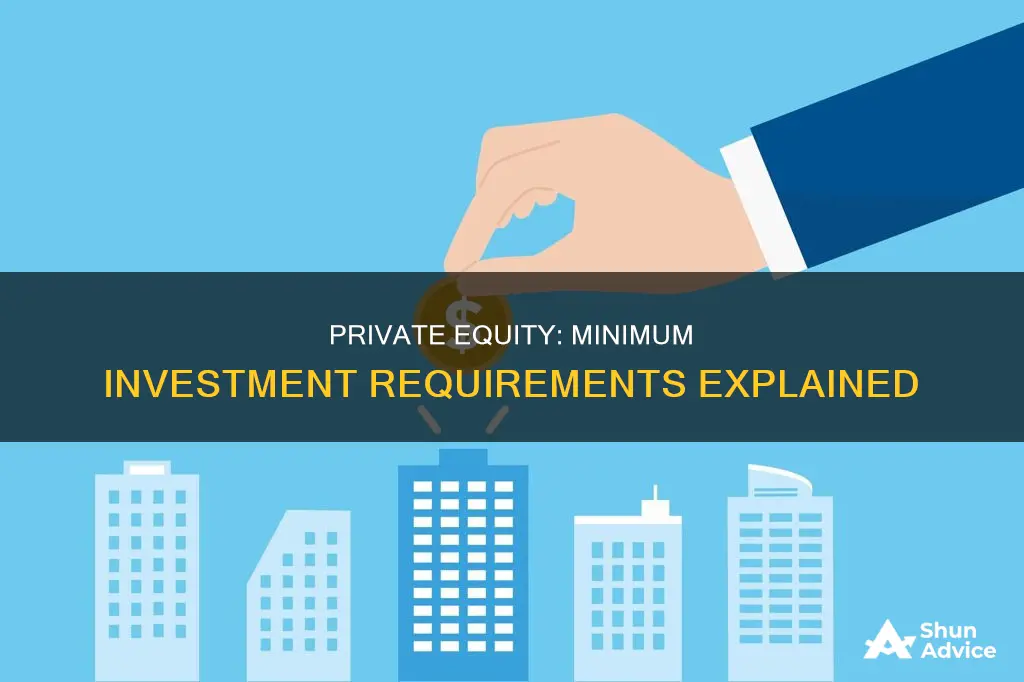
Private equity is a form of investment that takes place outside of the public stock market, with investors gaining an ownership stake in private companies. Private equity funds are a pooled investment offered by a private equity firm that allows a group of investors to combine their assets to invest, typically in a company or business.
Private equity is not easily accessible for the average investor. The minimum investment in private equity funds is typically $25 million, although it can be as low as $250,000 or even $25,000. These high minimum investments are because private equity is a high-risk, high-reward form of investment, with investors seeking outsized returns.
| Characteristics | Values |
|---|---|
| Minimum Investment Requirement | Typically $25 million, but can be as low as $250,000 or even $25,000 |
| Investor Type | Institutional investors or wealthy individuals |
| Examples of Institutional Investors | Large university endowments, pension plans, family offices |
| Investor Requirements | Accredited investor with a net worth of over $1 million or an annual income of over $200,000 in the last two years |
| Investment Period | At least 10 years |
| Non-direct Ways to Invest | Funds of funds, ETFs through brokerage platforms, special purposes acquisition companies (SPACs), crowdfunding |
What You'll Learn
- Private equity funds typically require a minimum investment of $25 million, although this can be as low as $250,000 or even $25,000
- To invest in private equity, you must be an accredited investor with a net worth of over $1 million or an annual income of over $200,000
- Private equity investments are illiquid, with investors needing to commit their money for at least 10 years
- Private equity firms use investors' money to invest in companies through buyouts or venture capital
- Private equity investments are high-risk, with no guarantee that the companies invested in will succeed

Private equity funds typically require a minimum investment of $25 million, although this can be as low as $250,000 or even $25,000
Private equity funds are a form of investment that takes place outside of the public stock market. Investors gain an ownership stake in private companies, which use the funds for developing new products and technologies, expanding working capital, making acquisitions, or strengthening their balance sheets.
Private equity funds typically require a minimum investment of $25 million. This is because private equity investing includes early-stage, high-risk ventures, and the funds are often used to gain influence or control over a company's operations. However, some firms have lowered their minimum investment amount to $250,000 or even $25,000 to attract a wider range of investors.
Even at the lower end of the investment scale, private equity is still out of reach for most people. To be considered an accredited investor, you must either earn an income of over $200,000 per year or have a net worth of over $1 million.
There are a few non-direct ways to invest in private equity with a smaller investment, such as through a fund of funds, exchange-traded funds (ETFs), or special purpose acquisition companies (SPACs). These options can provide greater diversification and potentially lower risk, but they also involve additional layers of fees and expenses.
Overall, private equity investing is a high-stakes, illiquid, and risky venture that is typically only accessible to wealthy individuals and institutional investors.
Impact Investment Managers: Creating Positive Change
You may want to see also

To invest in private equity, you must be an accredited investor with a net worth of over $1 million or an annual income of over $200,000
Private equity is a form of investment that takes place outside of the public stock market. It allows investors to gain an ownership stake in private companies.
Private equity investing is not easily accessible for the average investor. Most private equity firms typically look for investors who are willing to commit large sums of money. The minimum investment in private equity funds is typically $25 million, although it can be as low as $250,000 or even $25,000.
In addition to meeting the minimum investment requirements, you'll also need to be an accredited investor. This means your net worth, alone or combined with a spouse, is over $1 million, or your annual income was higher than $200,000 in each of the last two years.
Accredited investors are required because private equity is unregulated by the SEC. Private equity firms need a way to be reasonably confident that individuals who invest will be financially stable should their investments fail.
There are a few non-direct ways to invest in private equity for much less. These include buying a share of a private-equity exchange-traded fund (ETF), mutual funds, special purpose acquisition companies (SPACs), and crowdfunding.
Equity Investment Entry: Quickbooks Guide
You may want to see also

Private equity investments are illiquid, with investors needing to commit their money for at least 10 years
Private equity investments are illiquid, and investors typically need to commit their money for at least ten years. This long-term investment horizon is due to the nature of private equity investments, which often involve turning around struggling companies or investing in early-stage startups. This process can take many years before generating returns.
Private equity firms typically invest in one of three ways: venture capital, growth equity, or buyouts. Venture capital involves investing in early-stage startups, while growth equity involves investing in middle-stage companies. With buyouts, private equity firms purchase mature companies outright with the goal of internal improvement before selling them at a profit. All three of these strategies require a long-term investment horizon.
For example, in a buyout situation, a private equity firm may need to restructure the acquired company, improve its operations, and then wait for the right opportunity to sell it at a profit. This process can easily take a decade or more. Similarly, with venture capital and growth equity investments, it may take several years for a startup or middle-stage company to mature and generate returns for investors.
The illiquid nature of private equity investments is further exacerbated by the fact that private equity funds work differently from mutual funds. In private equity, investors typically must commit a set amount of money that the firm can use as needed within a specified period. This lack of liquidity can be a challenge for investors who need access to their capital.
However, the long-term commitment in private equity investments is also an advantage. It provides investors with peace of mind, knowing that their money is working for them behind the scenes. Additionally, the long-term horizon allows private equity firms to take a more passive approach to investing, as they are not focused on short-term gains.
Overall, private equity investments are illiquid and require a long-term commitment from investors. This commitment provides the necessary time for private equity firms to implement their strategies and generate returns for investors.
Shark Tank India: Investing in India's Future
You may want to see also

Private equity firms use investors' money to invest in companies through buyouts or venture capital
Private equity firms are distinct from other types of investors, such as venture capitalists, who provide cash infusions to small startups, or stock traders who make quick decisions about buying and selling shares in public companies. Instead, private equity firms aim to take control of a business for a relatively short period, restructure it, and then resell it at a profit. They do this through two main types of investments: buyouts and venture capital.
Buyouts
Buyouts, also known as leveraged buyouts (LBOs), are when a private equity firm buys a target company, sometimes using a combination of capital from investors and borrowed money, with the goal of selling it later at a profit. This can involve taking a mature public company private or purchasing a private company. Private equity firms may identify companies that are undervalued or underperforming and then work to increase their value before selling them, often through operational improvements or by growing the business. This strategy is often compared to house flipping, where a buyer makes improvements to a house and then sells it for a higher price.
Venture Capital
Venture capital, on the other hand, involves investing in early-stage startups or young companies in less mature industries. Private equity firms take significant stakes in these companies, hoping that they will evolve into powerful players in their industries. They may also guide the target company's management and help them navigate the challenges of growing a business.
Minimum Investment Requirements
Private equity investments typically have very high minimum investment requirements, which can range from a few hundred thousand to several million dollars. As a result, most private equity investing is limited to institutional investors, such as pension funds, or high-net-worth individuals. However, in recent years, some firms have lowered their minimum investment requirements to as low as $25,000, making private equity more accessible to a wider range of investors.
Maximizing Investments: Doubling Your Money in India
You may want to see also

Private equity investments are high-risk, with no guarantee that the companies invested in will succeed
Private equity investments are high-risk ventures with no guarantee of success. The companies that private equity firms invest in are predominantly early-stage ventures or startups, which are inherently unpredictable. They may have significant growth potential, but they are largely unproven, and failure is common. There is a real possibility that investors could lose all their money.
Private equity investments are also illiquid. Investors are expected to commit their funds for a long period, typically at least four to seven years, and often ten years or more. This is because private equity firms need time to implement their strategies, which may include replacing the management team, restructuring the business, cutting costs, or spinning off parts of the business. These strategies are designed to increase the return on investment, but they take time to bear fruit.
In addition, private equity firms are not required to publicly disclose information about their funds, and the companies they invest in are not subject to public scrutiny. This makes it difficult for investors to assess the risks involved.
There are several specific types of risk associated with private equity investing. One is operational risk, or the risk of loss resulting from inadequate processes and systems. Another is funding risk, which is the risk that investors are unable to provide their capital commitments. This is closely related to liquidity risk, as investors facing a funding shortfall may be forced to sell illiquid assets to meet their commitments. Market risk is also a factor, as private equity firms invest in small companies with high growth potential, and there is no guarantee that these companies will grow or succeed.
Overall, private equity investing is a speculative and illiquid endeavour with a high degree of risk. Investors need to be prepared for the possibility of losing all their money, and there are few protections in place if things go wrong.
Attracting Foreign Investment: Strategies for India's Growth
You may want to see also
Frequently asked questions
The minimum investment in private equity funds is typically $25 million, although it can be as low as $250,000 or even $25,000.
Only "accredited investors" are allowed to participate in private equity by the Securities and Exchange Commission (SEC). To be considered an accredited investor, you must either have a net worth of over $1 million or an annual income of over $200,000 in the last two years.
To calculate your net worth, add up all your assets (excluding your primary residence) and subtract your liabilities. You can use the SEC table to help with your calculation.
Investing in private equity can be very risky. Your investment funds will be illiquid and tied up for the long term, and there is no guarantee that the companies you invest in will succeed.
The biggest appeal of private equity is the potential for high returns. Private equity can also be used as a diversification strategy, as it gives investors access to deals not available on the public market.







